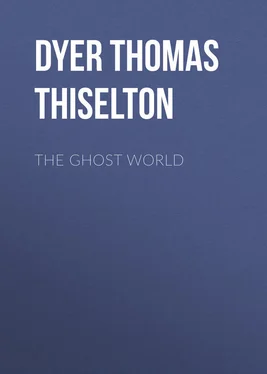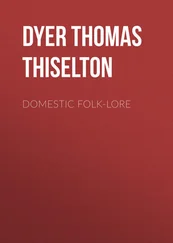Thomas Dyer - The Ghost World
Здесь есть возможность читать онлайн «Thomas Dyer - The Ghost World» — ознакомительный отрывок электронной книги совершенно бесплатно, а после прочтения отрывка купить полную версию. В некоторых случаях можно слушать аудио, скачать через торрент в формате fb2 и присутствует краткое содержание. Жанр: foreign_antique, foreign_prose, на английском языке. Описание произведения, (предисловие) а так же отзывы посетителей доступны на портале библиотеки ЛибКат.
- Название:The Ghost World
- Автор:
- Жанр:
- Год:неизвестен
- ISBN:нет данных
- Рейтинг книги:5 / 5. Голосов: 1
-
Избранное:Добавить в избранное
- Отзывы:
-
Ваша оценка:
- 100
- 1
- 2
- 3
- 4
- 5
The Ghost World: краткое содержание, описание и аннотация
Предлагаем к чтению аннотацию, описание, краткое содержание или предисловие (зависит от того, что написал сам автор книги «The Ghost World»). Если вы не нашли необходимую информацию о книге — напишите в комментариях, мы постараемся отыскать её.
The Ghost World — читать онлайн ознакомительный отрывок
Ниже представлен текст книги, разбитый по страницам. Система сохранения места последней прочитанной страницы, позволяет с удобством читать онлайн бесплатно книгу «The Ghost World», без необходимости каждый раз заново искать на чём Вы остановились. Поставьте закладку, и сможете в любой момент перейти на страницу, на которой закончили чтение.
Интервал:
Закладка:
Speaking of the human shadow in relation to foundation sacrifices, we are reminded 39 39 Nineteenth Century , July 1885, pp. 143-144, ‘Transylvanian Superstitions,’ by Madame Emily de Laszowska Gerard.
how, according to many ancient Roumenian legends, ‘every new church or otherwise important building became a human grave, as it was thought indispensable to its stability to wall in a living man or woman, whose spirit henceforward haunts the place. In later times this custom underwent some modifications, and it became usual, in place of a living man, to wall in his shadow. This is done by measuring the shadow of a person with a long piece of cord, or a ribbon made of strips of reed, and interring this measure instead of the person himself, who, unconscious victim of the spell thrown upon him, will pine away and die within forty days. It is an indispensable condition to the success of this proceeding that the chosen victim be ignorant of the part he is playing, therefore careless passers by near a building may often hear the cry, warning, “Beware, lest they take thy shadow!” So deeply engrained is this superstition, that not long ago there were professional shadow-traders, who made it their business to provide architects with the necessary victims for securing their walls.’ ‘Of course, the man whose shadow is thus interred must die,’ argues the Roumenian, ‘but as he is unaware of his doom, he does not feel any pain or anxiety, and so it is less cruel than walling in a living man.’
At the present day in Russia, as elsewhere, a shadow is a common metaphor for the soul, 40 40 Ralston’s Songs of the Russian People , p. 117.
whence it arises that there are persons there who object to having their silhouettes taken, fearing that if they do, they will die before the year is out. In the same way, a man’s reflected image is supposed to be in communion with his inner self, and, therefore, children are often forbidden to look at themselves in a glass, lest their sleep should be disturbed at night. It may be added, too, as Mr. Clodd points out, that in the barbaric belief of the loss of the shadow being baleful, ‘we have the germ of the mediæval legends of shadowless men, and of tales of which Chamisso’s “Story of Peter Schlemihl” is a type.’ 41 41 Myths and Dreams , 1885, p. 184.
Hence the dead in purgatory recognised that Dante was alive when they saw that, unlike theirs, his figure cast a shadow on the ground. But, as Mr. Fiske observes, 42 42 Myths and Myth-makers , 1873, p. 225.
‘the theory which identifies the soul with the shadow, and supposes the shadow to depart with the sickness and death of the body, would seem liable to be attended with some difficulties in the way of verification, even to the dim intelligence of the savage.’
Again, another doctrine promulgated under various forms in Animistic philosophy is, that the existence and condition of the soul depend upon the manner of death. The Australian, for instance, not content with slaying his enemy, cuts off the right thumb of the corpse, so that the departed soul may be incapacitated from throwing a spear; and even the half-civilised Chinese prefer the punishment of crucifixion to that of decapitation, that their souls may not wander headless about the spirit world. Similarly the Indians of Brazil ‘believe that the dead arrive in the other world wounded or hacked to pieces, in fact, just as they left this.’ European folk-lore has preserved, more or less, the same idea, and the ghost of the murdered person often appears displaying the wounds which were the cause of the death of the body. Many a weird and ghastly ghost tale still current in different parts of the country gives the most blood-curdling details of such apparitions; and although, in certain cases, a century or so is said to have elapsed since they first made their appearance, they still bear the marks of violence and cruelty which were done to them by a murderous hand when in the flesh. An old story tells how, when the Earl of Cornwall met the fetch of William Rufus carried on a very large black goat, all black and naked, across the Bodmin moors, he saw that it was wounded through the breast. Robert adjured the goat, in the name of the Holy Trinity, to tell what it was he carried so strangely. He answered, ‘I am carrying your king to judgment; yea, that tyrant, William Rufus, for I am an evil spirit, and the revenger of his malice which he bore to the Church of God. It was I that did cause this slaughter.’ Having spoken, the spectre vanished. Soon afterwards Robert heard that at that very hour the king had been slain in the New Forest by the arrow of William Tirell. 43 43 See Hunt’s Popular Romances of the West of England , p. 373.
This idea corresponds with what was believed in early times, for Ovid 44 44 Fasti , v. 457.
tells us how
Umbra cruenta Remi visa est assistere lecto.
Again, some modes of death are supposed to kill not only the body but also the soul. ‘Among all primitive peoples,’ writes Mr. Dorman, 45 45 Primitive Superstitions , p. 195.
‘where a belief in the renewal of life, or the resurrection, exists, the peace and happiness of the spirit, which remains in or about the body, depend upon success in preventing the body, or any part of it, from being devoured or destroyed in any manner.’ The New Zealanders believed that the man who was eaten was annihilated, both body and soul; and one day a bushman, who was a magician, having put to death a woman, dashed the head of the corpse to pieces with large stones, buried her, and made a large fire over the grave, for fear, as he explained, lest she should rise again and trouble him. The same idea, remarks Sir John Lubbock, 46 46 The Origin of Civilisation, and the Primitive Condition of Man , 1870, p. 140; see Letourneau’s Sociology , p. 263.
evidently influenced the Californian, who did not dispute the immortality of the whites, who buried their dead, but could not believe the same of his own people, because they were in the habit of burning them, maintaining that when they were burnt they became annihilated.
It may be added, too, that the belief underlying the burial customs of most American tribes was to preserve the bones of the dead, the opinion being that the soul, or a part of it, dwelt in the bones. These, indeed, were the seeds which, planted in the earth, or preserved unbroken in safe places, would in time put on once again a garb of flesh, and germinate into living human beings. 47 47 Brinton’s Myths of the New World , 1868, p. 257.
This Animistic belief has been amply illustrated by mythology and superstition. In an Aztec legend, after one of the destructions of the world, Zoloti descended to the realm of the dead, and brought thence a bone of the perished race. This, sprinkled with blood, grew on the fourth day into a youth, the father of the present race. The practice of pulverising the bones of the dead, practised by some tribes, and of mixing them with the food, was defended by asserting that the souls of the dead remained in the bones, and lived again in the living. 48 48 Dorman’s Primitive Superstitions , 1881, p. 193.
The Peruvians were so careful lest any of the body should be lost, that they preserved even the parings of the nails and clippings of the hair – expecting the mummified body to be inhabited by its soul; while the Choctaws maintain that the spirits of the dead will return to the bones in the bone mounds, and flesh will knit together their loose joints. Even the lower animals were supposed to follow the same law. ‘Hardly any of the American hunting-tribes,’ writes Mr. Brinton, ‘before their original manners were vitiated by foreign influence, permitted the bones of game slain in the chase to be broken, or left carelessly about the encampment; they were collected in heaps, or thrown into the water.’ The Yuricares of Bolivia carried this belief to such an inconvenient extent that they carefully put by even small fish bones, saying that unless this was done the fish and game would disappear from the country. The traveller on the western prairies often notices the buffalo skulls, countless numbers of which bleach on those vast plains, arranged in circles and symmetrical piles by the careful hands of the native hunters. The explanation for this practice is that these osseous relics of the dead ‘contain the spirits of the slain animals, and that some time in the future they will rise from the earth, re-clothe themselves with flesh, and stock the prairies anew.’
Интервал:
Закладка:
Похожие книги на «The Ghost World»
Представляем Вашему вниманию похожие книги на «The Ghost World» списком для выбора. Мы отобрали схожую по названию и смыслу литературу в надежде предоставить читателям больше вариантов отыскать новые, интересные, ещё непрочитанные произведения.
Обсуждение, отзывы о книге «The Ghost World» и просто собственные мнения читателей. Оставьте ваши комментарии, напишите, что Вы думаете о произведении, его смысле или главных героях. Укажите что конкретно понравилось, а что нет, и почему Вы так считаете.












